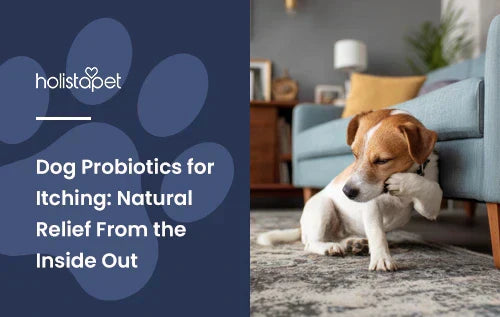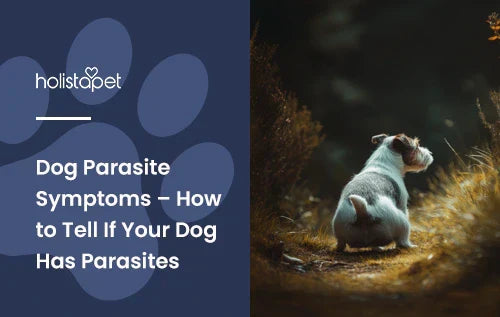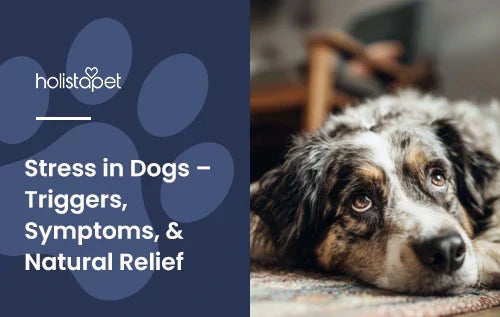A restless scratch can take over your pup's day fast. Dog probiotics for itching may help cut down on that habit by building a healthier gut, which supports calmer skin. The good bacteria crowd out the harmful kind, making it harder for skin issues to stick around.
A balanced microbiome keeps the coat looking better and your furry friend feeling more at ease. That's relief that shows, from shiny fur to a whole lot less scratching.
Understanding Why Dogs Itch

An itch usually starts with something small, such as dryness, a mild allergy, or a shift in the skin's natural balance. Once the skin barrier weakens, bad bacteria or environmental allergens can sneak in and stir things up. That's when a little scratch can turn into constant chewing or licking.
What's happening inside matters, too. For example, an unhealthy gut can throw off immune function, making the skin react more. Also, if your dog isn't absorbing nutrients well, their skin can lose strength and resilience. Fixing those root causes may keep the itch from running the show.
Common Causes of Itchy Skin in Dogs
Itchy skin can come from many places, and not all of them are easy to spot. Some are on the surface, while others start deeper inside the body. Knowing these most common triggers makes it easier to tackle the problem:
- Environmental Allergies. Environmental factors like pollen, dust mites, and mold can lead to irritated skin and cause excessive scratching.
- Food Sensitivities. Certain proteins or additives may upset the immune system and lead to skin issues.
- Parasites. Fleas, mites, and ticks can bite or burrow, causing immediate discomfort.
- Dry Skin. Low humidity or frequent bathing can strip natural oils, leaving skin flaky and itchy.
- Imbalanced Skin Microbiome. Too few beneficial bacteria on the skin allow harmful bacteria to thrive.
When Itching Signals an Internal Imbalance
Some itching starts on the surface, but other times, it's a sign of trouble inside the body. An unhealthy gut can upset the immune system, making the skin react to things it normally wouldn't. This can lead to constant scratching, licking, or chewing.
Digestive issues, poor nutrient absorption, and an overgrowth of bad bacteria can all affect the skin. When the gut environment is out of balance, the skin barrier weakens, making irritation harder to shake. Addressing the inside often brings long-lasting relief.
The Gut-Skin Connection in Dogs
A healthy gut, aside from supporting digestion, also plays a big role in skin health. The gut microbiome helps regulate immune response, which can influence how the skin reacts to allergens or bad bacteria. With a healthy microbiome, the skin stays stronger and less reactive.
If gut bacteria fall out of balance, it can trigger an inflammatory response. This can show up as redness, itching, or flaky skin. Supporting gut health, therefore, gives the skin a better chance to stay calm and clear.
Can Probiotics Help With Itching?
Yes. Probiotics may potentially help reduce itching by restoring balance to the gut microbiome. When beneficial bacteria thrive, they support immunity and keep bad bacteria in check, both of which can improve skin condition.
Studies suggest that probiotics may reduce symptoms linked to canine atopic dermatitis and other skin issues by improving gut and skin microbiome balance. While results vary, many dogs see less scratching after receiving the appropriate probiotic strains from their routine.
Key Benefits of Probiotics for Skin & Coat Health
Probiotics help your dog's skin stay calm and their coat look its best. By balancing gut flora, these beneficial bacteria can protect the surface and reduce irritation. Here are some perks your pup can enjoy with regular probiotic intake:
- Healthy Skin Barrier. Helps block harmful bacteria and allergens from causing irritation.
- Supports Immune Response. Supports a balanced reaction to environmental and food triggers.
- Promotes Nutrient Absorption. Makes sure the skin and coat get the vitamins and minerals they need.
- May Reduce Excessive Shedding. Promotes healthier hair growth and retention.
What To Look for in Probiotics for Dog Skin Allergies
The best probiotic formula targets both gut and skin health to help your pup stay comfortable. Check for these when making your choice:
- Strain Diversity & Potency. Multiple well-researched strains give broader support and help maintain a balanced microbiome.
- Clean, Hypoallergenic Formulas. Avoid common allergens and unnecessary fillers that could irritate sensitive skin.
- Added Skin-Supportive Nutrients. Ingredients like omega fatty acids, vitamins, and antioxidants can strengthen the skin barrier and improve coat health.
- Dog-Specific Options. Always opt for dog-specific probiotic items. Human probiotic options may include ingredients that dogs should avoid.
Best Probiotic Strains for Itchy Skin in Dogs
Certain probiotic strains stand out when it comes to easing itching. These strains can help balance gut bacteria, strengthen the skin barrier, and reduce irritation from allergies or bad bacteria:
- Bifidobacterium Animalis
- Bifidobacterium Longum
- Enterococcus Faecium
- Lactobacillus Plantarum
- Lactobacillus Rhamnosus
- Lactobacillus Casei
- Lactobacillus Acidophilus
- Streptococcus Thermophilus
Bifidobacterium Animalis
Bifidobacterium animalis helps food move through the digestive system smoothly, which supports regular bowel movements and better nutrient uptake. When dogs get more skin-friendly vitamins and minerals from their diet, the skin barrier stays stronger.
This strain is also known to recover gut balance quickly after stress, diet changes, or antibiotics. This helps reduce the chances of irritation and itching from an unhealthy microbiome.
Bifidobacterium Longum
Bifidobacterium longum is usually linked to a calmer immune response, which can make skin less reactive to allergens. It works by helping the gut break down and use nutrients that feed healthy skin and coat growth.
Studies suggest it may also support a more stable mood in dogs. This benefit can help limit stress-related scratching or licking.
Enterococcus Faecium
Enterococcus faecium is often used in veterinary probiotics because it survives stomach acid well and reaches the intestines alive. Once there, it helps beneficial bacteria grow and crowd out harmful strains. This support can ease digestive troubles that might trigger skin flare-ups, especially in canines recovering from antibiotics or stomach infections.
Lactobacillus Plantarum
Lactobacillus plantarum can attach to the gut lining, creating a natural barrier against bad bacteria. This strain produces compounds that may help reduce redness and puffiness linked to irritation. By supporting both gut and skin microbiomes, it may help keep seasonal or environmental itching from getting worse.
Lactobacillus Rhamnosus
Lactobacillus rhamnosus is one of the most studied strains for immune support. In canines, it can help train the immune system to react less strongly to harmless triggers like pollen or dust mites. This more balanced response may lead to calmer skin, less chewing at paws, and reduced hot spot flare-ups.
Lactobacillus Casei
Lactobacillus casei works well with other probiotic strains, boosting their ability to grow and survive in the gut. This teamwork effect can lead to better digestion, stronger nutrient uptake, and more support for skin repair. It's often used in blends for dogs with recurring skin problems tied to poor gut health.
Lactobacillus Acidophilus
Lactobacillus acidophilus is a classic probiotic strain known for helping maintain healthy gut pH. A balanced pH makes it harder for harmful bacteria to thrive, which can lower the risk of irritation.
It's also linked to better absorption of fatty acids. These are key nutrients for a shiny coat and moisturized skin.
Streptococcus Thermophilus
Streptococcus thermophilus is best known for producing enzymes that help digest lactose and other dairy sugars. In dogs sensitive to dairy, this can help prevent stomach upset that might indirectly affect skin health.
It also produces antioxidants. This can help protect skin cells from damage and keep the barrier stronger over time.
Signs Your Dog Might Benefit From Probiotic Chews
Some pups show clear signs that their gut and skin could use extra support. Probiotic chews can help restore balance, making these issues easier to manage:
- Persistent Itching. Constant scratching, chewing, or licking can signal an imbalanced gut or skin microbiome.
- Licking & Hot Spots. Moist, irritated patches often point to skin problems tied to gut health.
- Food Sensitivities. Trouble digesting certain foods can lead to flare-ups and discomfort.
- Antibiotic History. Past antibiotic use may reduce beneficial bacteria, making probiotics a useful way to replenish them.
HolistaPet's Probiotics for Dogs With Itchy Skin

HolistaPet's Probiotics for Dogs Soft Chews deliver targeted gut and skin support in an easy, tasty form. Each piece contains 3 billion CFU (colony-forming units) from a blend of strains, including L. acidophilus, L. casei, L. salivarius, L. plantarum, L. rhamnosus, L. brevis, Bifidobacterium bifidum, Streptococcus thermophilus, and B. lactis/longum.
These chews also pack skin-supportive ingredients like pumpkin, sweet potato, vitamin C, flax oil, rosemary extract, safflower oil, and sunflower lecithin. Together, they help replenish beneficial live microorganisms, support digestive balance, and promote healthier skin. Suitable for all breeds and sizes, they're a simple way to improve your best friend's comfort and overall well-being.
How To Introduce Probiotics to Your Dog's Routine
Start slow to give your dog's gut time to adjust. Begin with the lowest recommended dose on the product label or from your vet, and watch for changes in their digestion or skin. Some pups may show improvement within a week, while others may need more time for the benefits to build.
Make it part of their daily schedule, so it's easier to remember. Probiotic chews can go with meals for better absorption. Regular intake helps maintain a balanced gut and supports long-term skin comfort.
How Long Does It Take To See Results?
Most dogs start showing changes within two to four weeks of consistent probiotic intake. In some cases, you may notice improvements in digestion or skin comfort even sooner. The exact timeline depends on factors like the severity of the itching, the dog's overall health, and how imbalanced their gut microbiome was to start. For lasting results, keep probiotics in their routine long-term.
Other Natural Ways To Support Itchy Skin in Dogs
Probiotics work well, but combining them with other skin-friendly options can bring even better results. Here are some things to consider discussing with your vet:
- Omega Fatty Acids & Anti-Inflammatory Foods. These can help nourish skin from the inside out, improving texture and resilience. Omega-3s help lock moisture into the skin and reduce puffiness from irritation. Antioxidant-rich foods can protect skin cells from damage and support healthy coat growth. HolistaPet's Skin, Coat, & Nail Soft Chews are a great option. They blend fish oil, aloe vera, ascorbic acid, and biotin to keep skin smooth, coats shiny, and nails strong.
- CBD for Irritation & Skin Discomfort. CBD (cannabidiol) interacts with the body's endocannabinoid system (ECS), which helps regulate skin health and comfort. It may help soothe flare-ups and irritation, and support the immune response. HolistaPet offers broad-spectrum CBD oil, treats, chews, and capsules for an easy way to include it in your pet's routine.
Frequently Asked Questions About Dog Probiotics & Skin Allergies
Probiotics can play a role in easing itchy skin and supporting gut balance, but pet owners often have specific questions before starting. Here's a quick look at common concerns, so you can make informed choices for your buddy's comfort and well-being.
Can probiotics replace allergy meds?
Not usually. Probiotics support immune balance and skin health, but aren't a direct substitute for prescribed allergy medication. They work best as part of a broader allergy support plan from your vet. In some cases, they may allow for lower doses of medication over time with veterinary guidance.
Can dogs be allergic to probiotics?
It's rare, but possible. Reactions often come from added ingredients, not the probiotics themselves. Choose clean, hypoallergenic formulas to reduce the risk. If you notice new skin irritation or stomach upset, stop giving the probiotics and check with your vet.
Are probiotics safe for year-round use?
Yes, most dogs can take probiotics daily. Long-term use helps maintain gut balance, supports immune function, and keeps skin in better condition over time. Regular use may also help prevent flare-ups rather than only addressing them after they start.
What's better for dogs: chews, powders, or capsules?
Chews are often easiest to give and feel like a treat. They also make dosing simple, which helps you stay consistent for the best results. Powders and capsules work too, but may be harder to give if your pooch is picky.
Final Thoughts - Best Probiotics for Itchy Dogs
The right probiotic can make a noticeable difference for pups dealing with itching. By restoring gut balance, they help support immune function, strengthen the skin barrier, and keep bad bacteria in check.
HolistaPet's Probiotics for Dogs offer a targeted blend of strains plus skin-friendly nutrients, making them a simple, tasty way to promote comfort, better skin, and overall well-being in your pup. When your buddy feels better in their skin, every wag, cuddle, and happy glance becomes that much sweeter.


 CBD Oil for Dogs - Fast Acting
CBD Oil for Dogs - Fast Acting
 Chicken Flavored CBD Oil For Dogs - Easy Dose
Chicken Flavored CBD Oil For Dogs - Easy Dose
 Salmon Flavored CBD Oil For Dogs - Highly Rated
Salmon Flavored CBD Oil For Dogs - Highly Rated
 CBG Oil for Dogs and Cats - Loved by Thousands
CBG Oil for Dogs and Cats - Loved by Thousands





Leave a comment
All comments are moderated before being published.
This site is protected by hCaptcha and the hCaptcha Privacy Policy and Terms of Service apply.